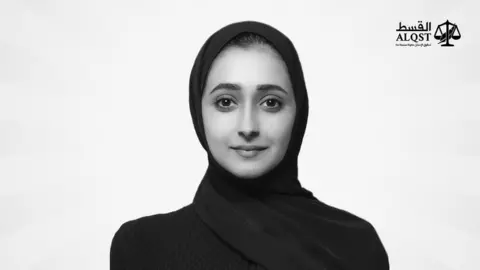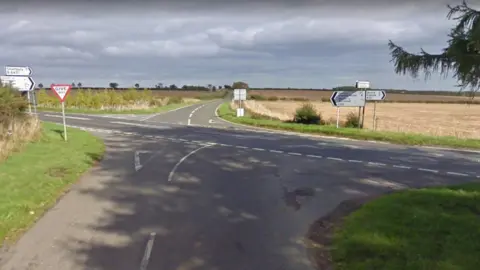Alaa Al-Siddiq inquest: Questions raised over junction where activist died
 AlQST
AlQSTQuestions were raised about the visibility around a junction where an Emirati human rights activist was killed in a crash, an inquest heard.
Alaa Al-Siddiq, 33, from London, died in the collision at the junction of the A361 and the B4437 near Shipton-under-Wychwood, Oxfordshire, on 20 June 2021.
She was the executive director of London-based human rights group ALQST.
Assistant Coroner Joanna Coleman concluded she died in a road traffic collision.
The BMW in which Ms Al-Siddiq was a passenger crossed the junction without giving way, Oxford Coroner's Court was told.
But Thames Valley Police traffic management officer Christopher Hulme said "questions were raised" afterwards by investigating officers "regarding signing, road markings, and vegetation".
He said the road markings controlling the junction, which has a single give-way sign, were "badly worn and faded and no longer visible".
 Google
GoogleThe BMW hit a Land Rover driven by Robert Alexander, who was with his wife Rachel, and two dogs.
Ms Alexander, who was left with six rib fractures, said the BMW "came out of nowhere" like a "bat out of hell".
The inquest heard neither driver failed toxicology tests or had medical issues.
In reaching her conclusion, Ms Coleman said the Land Rover, which had priority, had struck the BMW on the rear passenger side where Ms Al-Siddiq had been sitting.
She was pronounced dead at the scene, with the post-mortem examination revealing she died from multiple injuries.
Ms Coleman added: "There is a history of collisions at the junction and I am reassured that work is taking place to refresh the junction markings, add give-way signage and cut back vegetation."
Ms Al-Siddiq had been in the Cotswolds to celebrate her birthday with a group of friends.
ALQST, which works to defend human rights in Saudi Arabia, previously described her as an "icon of the Emirati human rights movement".
She worked as a volunteer at ALQST before going on to become its executive director.
It later emerged, according to the Guardian, that her devices may have been hacked by a government client of NSO Group, the Israeli spyware company.

Follow BBC South on Facebook, Twitter, or Instagram. Send your story ideas to [email protected].
